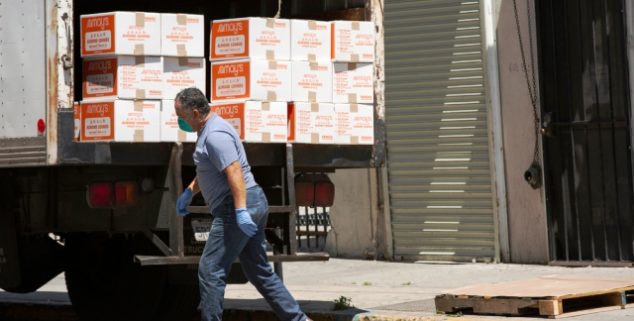Opinion
Legislature eyes bill that could seriously hurt supply chain
 A worker unloads cargo at an outlet in LA's Chinatown district.(Photo: Matt Gush, via Shutterstock)
A worker unloads cargo at an outlet in LA's Chinatown district.(Photo: Matt Gush, via Shutterstock)There is no question that the COVID-19 pandemic has impacted all of us. Brick and mortar small businesses have been forced to quickly adapt or face the very real possibility of shutting their doors. On top of that, consumers are paying more for everything while backordered goods have become the new normal.
And yet, our state legislators are supporting Assembly Bill 701, which could increase costs for everyday goods, create more disruptions across our vital supply chains, and make it more challenging to keep goods on shelves. It doesn’t make sense.
AB 701 is another broad legislative proposal that creates more problems than it solves — unleashing a host of unintended consequences that impact far too many industries. In fact, AB 701 will hurt small businesses, farmers, and consumers, ultimately damaging supply chains that deliver our food and everyday household items.
These jobs are great alternatives for first-time job seekers looking to establish work histories because they often do not require resumes.
This bill adds more regulation for warehouse operators, creating costly, confusing and duplicative rules. Even worse, it encourages frivolous lawsuits by creating new causes of action under the Private Attorneys General Act of 2004 (PAGA) with no benefit for consumers, workers, or our economy.
Last year, when the pandemic forced businesses to shut their doors, millions moved their operations online, depending on fulfillment centers, warehouses and the supply chain to stay afloat. We know that small businesses — especially women and minority-owned businesses — are less capable of keeping up with rising costs, delays and other obstacles that will be created by AB 701. Small businesses still need to strengthen their financial capabilities even when it comes to the basics like having a relationship with a bank. This is, in part, why small businesses suffered the most during the pandemic and had less access to funds through the Paycheck Protection Program.
A Yelp economic report examining the first six months of the pandemic revealed there were 15,000 business closures in Los Angeles County, with half of those expected to be permanent. We can’t afford legislation that would force more small businesses to close.
The impact to jobs can’t be underestimated. AB 701 will cause the state to lose stable, well-paying jobs that warehouses bring to communities in need of economic development and growth. These jobs are great alternatives for first-time job seekers looking to establish work histories because they often do not require resumes.
AB 701 will also hurt farmers who depend on processing, packaging and distribution centers to store their food before it makes it to our neighborhood grocery stores and restaurants.
As we have learned, it’s vital that we keep our supply chains strong and functioning. Remember the early days of the pandemic when grocery store shelves were empty and it took months to receive anything that we ordered online? The regulation proposed by AB 701 will create new challenges for our supply chains just as we’re trying to recover from the pandemic.
Ultimately, everything we buy and use moves through the manufacturing, storage, and distribution process. Whether it’s our food moving from the farm to fork or clothes from the thread to our closet, we’ll all pay the price for AB 701.
We can’t afford higher prices, more shipping delays, lost jobs, and business closures. I urge you to call your legislator and tell them to vote “no” on AB 701 to protect jobs, small businesses, farmers, and consumers.
—
Editor’s Note: Maria S. Salinas is the president and chief executive officer at the Los Angeles Area Chamber of Commerce.
Want to see more stories like this? Sign up for The Roundup, the free daily newsletter about California politics from the editors of Capitol Weekly. Stay up to date on the news you need to know.
Sign up below, then look for a confirmation email in your inbox.

Leave a Reply